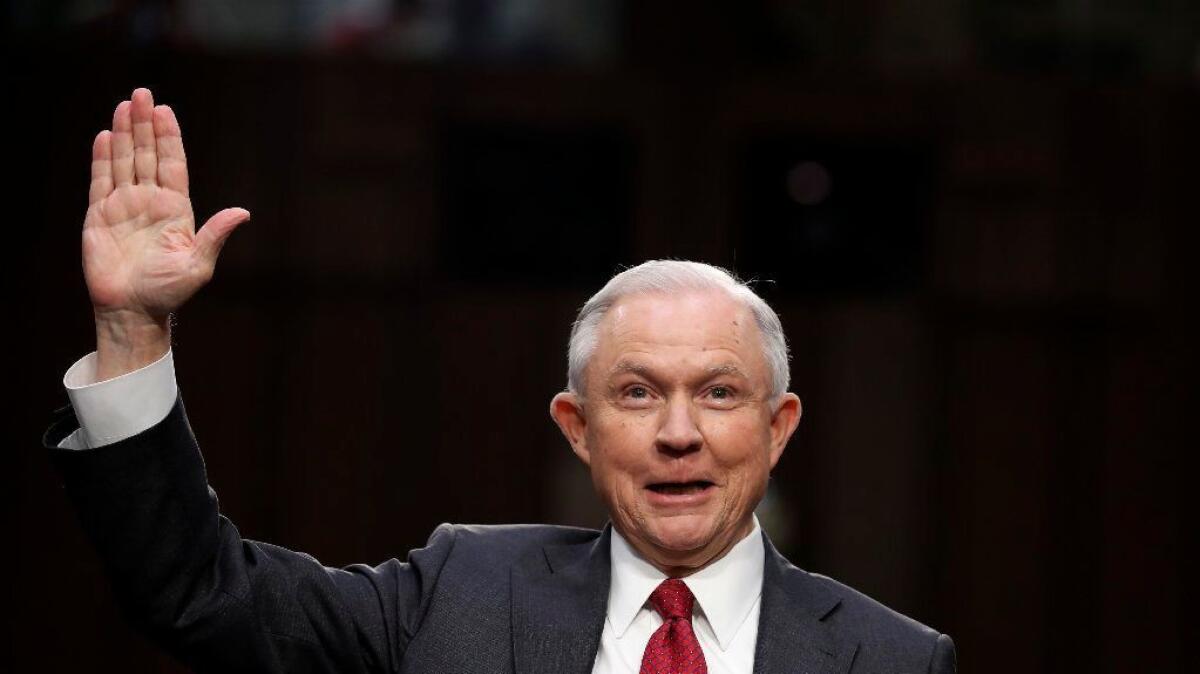Opinion: Jeff Sessions’ testimony was curiously uncurious about Comey’s firing

- Share via
Atty. Gen. Jeff Sessions went before the Senate Intelligence Committee on Tuesday to defend his honor against “scurrilous and false allegations.” How did he do?
The first allegation Sessions addressed was actually fairly easily disposed of — that he was involved in collusion with Russia as an adviser to the Trump campaign, an assertion he called “an appalling and detestable lie.”
This allegation is partly a product of Sessions’ misleading testimony during his confirmation hearings when he said that “I did not have communications with the Russians.” It later emerged that he had twice met with Russian Ambassador Sergey Kislyak during the campaign, once at the Republican National Convention and once in his Senate office. He later said he hadn’t mentioned those meetings in his testimony because he had been asked about contacts as a surrogate for the Trump campaign, not as a senator.
Talk of collusion increased last week when fired FBI Director James B. Comey testified that there were “facts that I can’t discuss in an open setting that would make [Sessions’ ] continued engagement in a Russia-related investigation problematic.”
On Tuesday, Sessions complained about a “rambling” question from Sen. Al Franken that had prompted his answer. More persuasively, he dismissed questions about whether he had a third meeting with Kislyak at a speech by Trump at the Mayflower Hotel in Washington in April 2016. He recalled attending a reception before the speech attended by two dozen people, but said he had no recollection of talking to the Russian ambassador.
The outrage rang true. The Mayflower event was hardly a venue for swapping secrets. As for recusal, Sessions credibly insisted that he withdrew from the Russia investigation not because of any improper contacts on his part with Russia but because of his involvement in the Trump campaign.
Although it might not qualify as an allegation, let alone a scurrilous one, another impression left by Comey’s testimony last week was that Sessions was indifferent to Comey’s complaint that Trump had cornered him after a meeting in the Oval Office on Feb. 14. That was the conversation in which, according to Comey, Trump said he hoped that Comey would drop the investigation of former National Security Advisor Michael Flynn.
In his testimony, Comey said that when he told Sessions that he should never be left alone with the president again Sessions “did not reply.” That sounds sinister. But Sessions offered a not-that-different account. He told the committee that Comey “expressed concern about being left alone with the president.” Far from being silent, Sessions said he “backed [Comey] up in his concerns.”
Sessions also offered a plausible defense to the argument that he violated the terms of his recusal by participating in the firing of Comey. “It is absurd, frankly,” he said, “to suggest that a recusal from a single specific investigation would render an attorney general unable to manage the leadership of the various Department of Justice law enforcement components that conduct thousands of investigations.”
The problem with that explanation is that it assumes that Russia had nothing to do with Comey’s firing. And it’s on that question — the reason Comey was fired — that Sessions’ performance was the least assured and the most evasive.
Sessions resisted an attempt by Sen. Dianne Feinstein to pin him down on whether he knew, when he recommended to Trump that he fire Comey based on a memo by Deputy Atty. Gen. Rod Rosenstein, that the president had already decided to fire the director.
Also, the Rosenstein memo faulted Comey for mishandling the investigation of Hillary Clinton’s use of a private email server. Yet Sen. Jack Reed (D-R.I.) confronted Sessions with the fact that last year he had praised Comey for the way he had handled the Clinton investigation.
Overall, Sessions seemed curiously uncurious about Trump’s real motives in firing Comey, or about whether he and Rosenstein had been enlisted to supply what was in effect a cover story.
Sen. Susan Collins (R-Maine) asked him: “If you had known that the president subsequently was going to go on TV and in an interview [with] Lester Holt of NBC would say this Russian thing was the reason for his decision to dismiss the FBI director, would you have felt uncomfortable about the timing of the decision?” Sessions responded: “I don’t think it’s appropriate to deal with those kind of hypotheticals. I have to deal in actual issues. I would respectfully not comment on that.”
Perhaps most frustrating for Democratic senators on the committee, Sessions refused to discuss conversations he had with Trump that might shed light on the president’s motives in firing Comey — even though he acknowledged that only the president can invoke executive privilege.
It was a less than persuasive legal argument — but one that Trump probably appreciated.
Follow the Opinion section on Twitter @latimesopinion and Facebook
More to Read
A cure for the common opinion
Get thought-provoking perspectives with our weekly newsletter.
You may occasionally receive promotional content from the Los Angeles Times.











